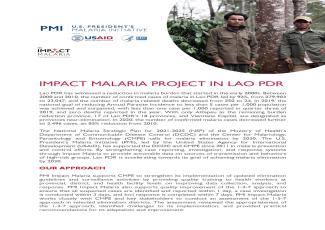Lao PDR has witnessed a reduction in malaria burden that started in the early 2000s. Between 2000 and 2010, the number of confirmed cases of malaria in Lao PDR fell by 92%, from 279,903 to 23,047, and the number of malaria related deaths decreased from 250 to 24. In 2019, the national goal of reducing Annual Parasite Incidence to less than 5 cases per 1,000 population was achieved and surpassed, with less than one case per 1,000 reported in quarter three of 2019, and zero deaths reported in the year. With only Attapeu as the remaining burden reduction province, 17 of Lao PDR’s 18 provinces, and Vientiane Capital, are designated as provinces near-elimination. In 2020, the number of confirmed malaria cases decreased further to 3,496 cases, an 85% reduction from 2010.
The National Malaria Strategic Plan for 2021-2025 (NSP) of the Ministry of Health’s Department of Communicable Disease Control (DCDC) and the Center for Malariology, Parasitology and Entomology (CMPE) calls for malaria elimination by 2030. The U.S. President’s Malaria Initiative (PMI), led by the United States Agency for International Development (USAID), has supported the DCDC and CMPE since 2011 in malaria prevention and control efforts. By strengthening case reporting, investigation, and response systems through Impact Malaria to provide actionable data on sources of transmission and behaviors of high-risk groups, Lao PDR is accelerating towards its goal of achieving malaria elimination by 2030.
OUR APPROACH
PMI Impact Malaria supports CMPE to strengthen its implementation of updated elimination guidelines and surveillance activities by providing quality training to health workers at provincial, district, and health facility levels on improving data collection, analysis, and response. PMI Impact Malaria also supports quality improvement of the 1-3-7 approach to ensure that all suspected cases are identified and reported within 1 day, a case investigation is conducted within 3 days, and foci response is completed within 7 days. PMI Impact Malaria works closely with CMPE and key stakeholders to conduct an assessment of the 1-3-7 approach in selected elimination districts. The assessment reviewed the appropriateness of the 1-3-7 approach, identified challenges to its implementation, and provided practical recommendations for its adaptation and improvement.
IMPACTS AND RESULTS
- In response to the COVID-19 pandemic, PMI Impact Malaria and CMPE developed a modified training methodology by adopting a Training of Trainers (TOT) cascade approach for 200 key health workers in 69 districts. The trained health workers went on to conduct 19 workshops to train 434 health center trainees on 1-3-7 approach. Average pre-post test scores from the 19 workshops increased from 55% to 82%.
- PMI Impact Malaria, in consultation with CMPE, developed, conducted, and disseminated results from an assessment of the 1-3-7 approach. The assessment results and corresponding recommendations were used to inform targeted improvements to the strategy.
- PMI Impact Malaria has supported CMPE to improve the quality and use of documentation related to the 1-3-7 approach, including strengthening practices on filing documentation at district and health center levels.
For more information, visit USAID.gov/laos or email to infolaos@usaid.gov


